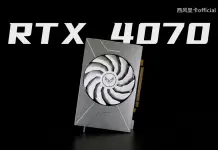Are you eyeing a PC case made mostly from metal? It’s about to get more expensive.
The PC industry is already grappling with Trump’s tariffs on Chinese imports. Now, vendors and customers face another cost increase thanks to separate tariffs on aluminum-based goods, including PC cases and graphics cards.
“Yes, we’ve already been affected heavily,” says Kelt Reeves, CEO of Falcon Northwest, a custom desktop PC maker in Oregon.
Although Falcon Northwest was prepared to pay Trump’s 20% tariff on Chinese imports, it was surprised to learn it had to pay even more on a shipment of PC cases due to Trump’s 25% tariff on aluminum imports, which took effect on March 12.
“We thought that tariff was on raw aluminum and steel, not finished PC cases,” Reeves tells us. But the policy also targets aluminum “derivative” products, like PC hardware.
(Credit: John Burek/PCMag)
SilverStone Technology, another Taiwan-based PC case maker, tells us: “Many of our cases are constructed mostly of steel and aluminum, so we’ve been nailed with a 25% additional tariff on top of the 20% general tariff for anything coming from China.
“We are passing on these price increases to our customers as needed depending on how much inventory we already have,” SilverStone adds.
InWin, another PC case vendor, reports the same. “We are currently using our existing inventory to maintain our prices, but as our inventory runs low, we may need to adjust our prices soon.”
If You’re on the List, There Are No Exceptions
Trump’s aluminum tariffs target the PC industry through two tariff codes: The first, 8473.30.2000, broadly covers PC components since it applies to “Parts and accessories, including face plates and lock latches, of printed circuit assemblies.” The second, 8473.30.5100, also targets PC desktops and casings for components, including graphics cards, according to the Consumer Technology Association, a trade group that represents electronics vendors.
(Credit: US Customs)
Get Our Best Stories!

What’s New Now
By clicking Sign Me Up, you confirm you are 16+ and agree to our Terms of Use and Privacy Policy.
Thanks for signing up!
Your subscription has been confirmed. Keep an eye on your inbox!
“If the products are on the list, there are no exceptions to the tariff,” says Laura Rabinowitz, an international trade lawyer for Greenberg Traurig.
(Trump has also imposed a 25% tariff on steel imports, but as far as we can tell, the order doesn’t contain the tariff codes 8473.30.2000 or 8473.30.5100.)
We learned of the aluminum tariff impact from Reddit user “Neoescape,” who warned that these additional duties affected GPUs. “We recently imported several data center GPUs and got blindsided by a huge bill due to this additional 25% aluminum-related tariff,” the user wrote before moderators mysteriously deleted the post.
The tricky part is calculating the exact cost of the aluminum tariff. An FAQ from US Customs and Border Protection says the tariff cost is based on the “value” of the aluminum content in the import. But, according to the Reddit user Neoescape: “If the supplier or store you purchase from doesn’t specify the exact amount of aluminum content within each graphics card (which is extremely difficult, if not impossible, to acquire), customs brokerage services (such as UPS, FedEx, etc.) default to assessing the tariff based on 100% of the shipment’s value.”
Recommended by Our Editors
In more bad news, Falcon Northwest warns that PC case prices could increase even more. That’s because a set of tariffs specifically targeting Chinese-made PC components like GPUs and motherboards could resume in June after the Biden administration hit pause on them.
“We’ve been told by our importers that another 25% tariff on PC cases from China that had been implemented years ago, but waived for years, will have its waiver expire on May 31st, and no one expects this administration to renew it,” Falcon Northwest’s Reeves says. “So that could mean the 45% tariff we’re already seeing could jump to 70%. It’s absolute madness and happening faster than we can plan for.”
Other vendors are trying to dodge Trump’s tariffs by migrating their manufacturing from China to markets like Vietnam and Taiwan. But for now, Reeves says: “Most PC components are made in China, and sadly most do not have US supplier alternatives we can turn to.”
Meanwhile, Trump is planning to impose “reciprocal” tariffs tomorrow, Wednesday, to match the duties that other countries charge on US products. But the White House has yet to release exact details.
A new CNET survey finds that over one-third of US adults feel pressured to purchase things like electronics in anticipation of tariff-related price hikes. And nearly one in five US adults (17%) made a purchase to get out ahead of potential cost increases.
About Michael Kan
Senior Reporter





















_(4)-218x150.png)

















